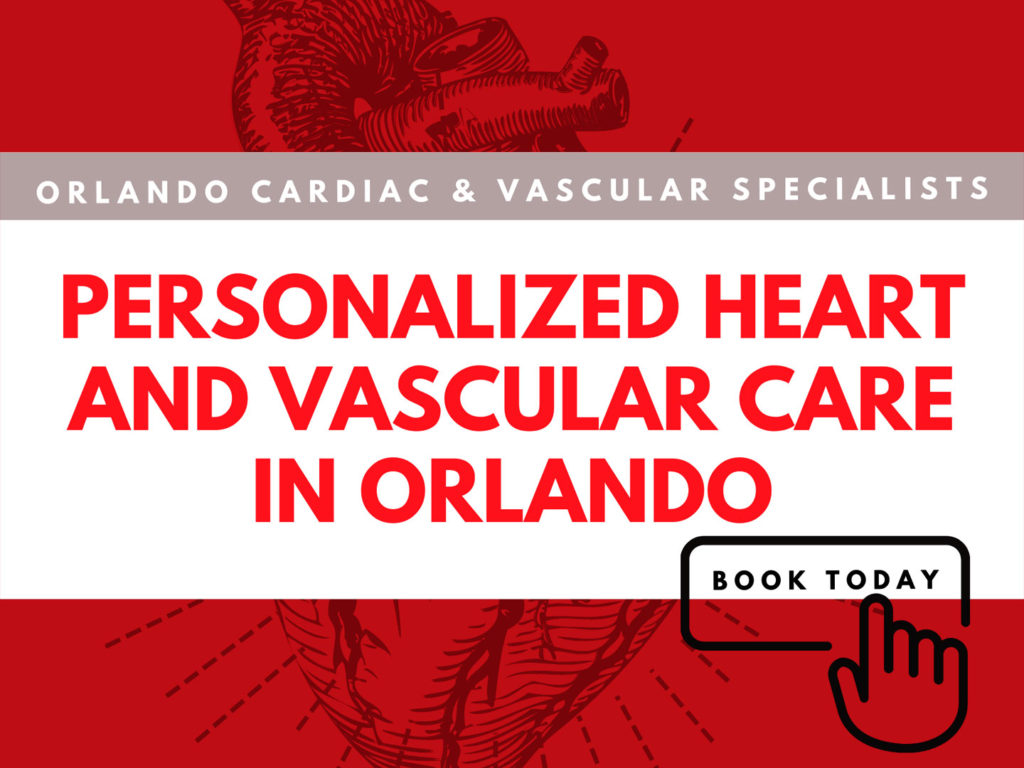Diagnosis & Treatment
Orlando Cardiac & Vascular Specialists works closely with each patient to help diagnose heart disease based on your medical and family histories, a physical exam, and results from tests. One reason the OCVS medical team asks you a series of questions and orders diagnostic tests are to rule out other conditions that could be causing your symptoms.
Cardiac Symptoms
If you are experiencing any of those symptoms, please contact us to schedule appointment.- Chest discomfort
- Chest pain
- Dizziness
- Exertional fatigue
- Fainting
- Leg discomfort
- Leg swelling
- Palpitations
- Shortness of breath
Conditions Treated
We evaluate and treat various diseases including, but not limited to, the following:- Angina
- Aortic Aneurysm
- Atrial Fibrillation (flutter)
- Bradycardia
- Cardiac Arrhythmia
- Cardiomyopathy
- Carotid Disease
- Congestive Heart Failure
- Deep Venous Thrombosis
- Elevated Cholesterol
- Elevated Triglycerides
- Endocarditis
- Heart Attack
- Hypertension
- Mitral Valve Prolapse
- Pericarditis
- Peripheral Vascular Disease
- Supra Ventricular Tachycardia
- Syncope (fainting)
- Valvular Heart Disease
- Ventricular Ectopy
- Ventricular Tachycardia
Diagnostic Tests
Here is a lists of tests routinely used to help our patients get the diagnosis and care they need:Blood Tests
Blood tests for cholesterol, triglycerides, and other measures of heart health.Blood Pressure Test
Measuring blood pressure is part of routine doctor’s visits, but it’s also an important part of diagnosing heart disease.Electrocardiogram
Whether you spell it EKG or ECG, it’s an electrocardiogram. This test records the electrical activity of your heart through small electrode patches attached to the skin of your chest, arms and legs. EKG’s are safe, painless and inexpensive tests that are routinely performed if a heart condition is suspected.Chest X-Ray
A chest X-ray (aka chest film) uses a very small amount of radiation to produce an image of the heart, lungs, and chest bones on film. The three may purposes a OCVS physician will use a chest x-ray is to:
- Look at the structures of the chest (bones, heart, lungs)
- Evaluate placement of devices (pacemakers, defibrillators) or tubes placed during hospitalization for treatment and monitoring (catheters, chest tubes)
- Diagnose lung and cardiac diseases
Echocardiogram
There are several variations on the echocardiogram, or “echo,” as doctors call it. Here’s what they are looking for:
- Assess the overall function of your heart.
- Determine the presence of many types of heart disease.
- Follow the progress of heart valve disease over time.
- Evaluate the effectiveness of medical or surgical treatments.
Cardiac Catheterization
Cardiac catheterization — also called a coronary angiogram — means running a catheter into your heart. It’s done to help doctors see what’s going on in there, and whether they need to operate.Stress Test
Does your heart respond well to exertion? That’s what a stress test looks for. Treadmill and Nuclear Stress Tests are performed by OCVS physicians to determine the amount of stress that your heart can manage before developing either abnormal rhythm or evidence of ischemia.Carotid, Arterial, and Venous Duplex Imaging
These safe, painless tests use high frequency sound waves to create pictures of the inside of your veins and arteries in order to evaluate the structure and function of your veins and/or arteries and to detect any potential conditions or abnormalities.Electrophysiology Test
Electrophysiology — the EP test — takes measurements of your heart rhythm — recording the electrical activity and pathways of your heart.CT Heart Scan
Computed tomography (CT scan) of the heart can visualize your heart’s anatomy. Calcium-score heart scan and coronary CT angiography are just a few types used to diagnose heart disease.Myocardial Biopsy
A myocardial biopsy is when a doctor uses a special catheter to remove a piece of your heart tissue for examination to help further examine and diagnose a patients heart condition.Heart MRI
A heart MRI is a great way for doctors to get a look — from the outside — at how your heart is working. This technique obtains information about the heart as it is beating, creating images of the heart throughout it’s pumping cycle.Pericardiocentesis
Pericardiocentesis — also called a pericardial tap — means using a needle to get a sample of the fluid in the sac surrounding the heart. The fluid is tested for signs of infection, inflammation, presence of blood etc.Although the process of diagnosing heart disease seems lengthy, you’ll be glad to know the results when you get to the end. Contact our office today to learn more about scheduling an appointment with one of our dynamic Board Certified Cardiovascular Specialists.

